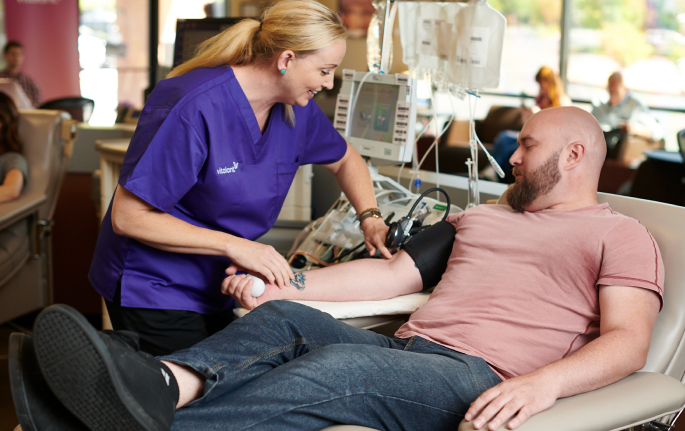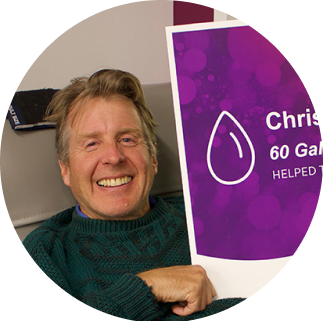hideme
Blood transfusion saved the lives of these three blood recipients



Why do hospitals still need blood donations?
Every 2 seconds, someone in the U.S. needs blood. Blood is vital for trauma victims, cancer patients and many others, and there’s a constant need for it. Doctors depend on a ready source of blood when performing surgeries and providing other treatments for their patients. What’s more, blood cannot be manufactured and can only come from volunteer donors — people like you.
Each new donor helps us meet patient need, and each patient is somebody’s loved one — meaning your donation impacts many people.

The process of giving blood is simple — plus, there are benefits for you

Donating blood is easy, and it can save someone’s life. The entire process takes less than an hour, and the actual donation time only about 10 minutes.
Everyone knows that blood donations help patients. But did you know it benefits you, too? When you donate blood, your cholesterol levels, temperature, pulse and blood pressure are checked. If you’re itching to know if you’re as healthy as you feel, this is a great way to find out while helping others in the process.
Wondering about your eligibility? Here are the basics when it comes to donating blood:
- You must be at least 16 years old (16- and some 17-year-olds must bring a signed permission form from a parent or guardian, if required by state or school).
- Weigh at least 110 pounds.
- Be in good general health.
What if I don’t know my blood type? Can I still give?
Yes! If you don’t know your blood type, there’s an easy way to find out. All donors who come to give blood at Vitalant can learn their blood type in a few days after their first visit.
Fun fact: Your blood has what is known as an Rh factor: It either contains a certain protein or it doesn’t. This is the positive [+] or negative [-] that follows your blood type letter(s). The possible combinations create eight different blood types: A+, A-, B+, B-, AB+, AB-, O+ and O-. Whatever your type, every donor is needed and every donation transforms lives — including your own.
There are four basic blood groups, and yours is one of these:
Type A
A — Includes A-positive and A-negative. A-positive is the second most frequently occurring blood type, whereas A-negative is more rare.
Type B
B — Includes B-positive and B-negative, both of which are among the rarest blood types. B-positive donors can give blood to patients with B-positive or AB-positive. B-negative can give blood to patients with any B or AB type.
Type AB
AB — Includes AB-positive and AB-negative. Considered “universal recipients,” patients with AB-positive blood can accept red cells from any other blood type. AB-negative is the most rare blood type in the U.S.
Type O
O — Includes O-negative and O-positive. Anyone can receive O-negative blood regardless of their blood type. O-positive is the most common blood type and the most commonly transfused by hospitals.
Ok, I want to donate, but I heard that …
To put any concerns you may have to rest, let’s debunk some common myths related to blood donation.
.png)
I can’t donate because I traveled recently.
FACT: This depends on where you traveled to and when, and most international travel will NOT interfere with blood donation. Worse-case scenario, you’re temporarily deferred, but if not, you could save up to three lives.

I can’t donate because I’m taking medication.
FACT: Perhaps surprisingly, most medications are acceptable. Many people with conditions such as diabetes or high blood pressure that are controlled with medication donate regularly.
If you take medication, please review our medications list for more information. Questions about medications, travel or temporary deferrals? Please call us at 1-877-258-4825 and choose Option 1.

I can’t donate blood because of my tattoos and piercings.
FACT: If you were tattooed or pierced with a sterile needle and single-use ink at a state-regulated tattoo parlor, you can donate without restriction. If you got a tattoo, permanent make-up or micro-blading in one of the following states/cities, we’ll ask you to wait 3 months from the date it was applied before giving blood:
- Connecticut, Georgia, Idaho, Maryland, Massachusetts, New Hampshire, New York, Pennsylvania, Utah, Wyoming and Washington, D.C.
All other states/areas are properly regulated and will not interfere with your ability to donate blood.
Here’s why these 3 donors give

As a nurse practitioner, Annie knows firsthand how vital blood is, and donates blood regularly. She encourages others to donate too.

Chris became a dedicated blood donor following a serious skydiving accident in 2001. To date, he’s given more than 480 donations for patients.

After blood donors helped his mom live a longer life, Bill vowed to repay that kindness by donating at least 25 gallons of blood over time.
